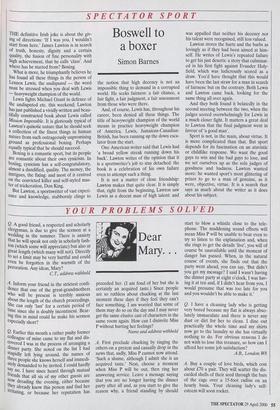SPECTATOR SPORT
Boswell to a boxer
Simon Barnes
THE definitive Irish joke is about the giv- ing of directions: 'If I was you, I wouldn't start from here.' James Lawton is in search of truth, honesty, dignity and a certain quality, the fusion of fine personality with high achievement, that he calls 'class'. And Where has he started from? Boxing.
What is more, he triumphantly believes he has found all these things in the person of Lennox Lewis, the undisputed — the word must be stressed when you deal with Lewis — heavyweight champion of the world. Lewis fights Michael Grant in defence of the undisputed etc. this weekend; Lawton has just published a vividly written and beau- tifully constructed book about Lewis called Mission Impossible. It is gloriously typical of Lawton's quixotic nature that he should seek a collection of the finest things in human nature from such outrageously unpromising ground as professional boxing. Perhaps equally typical that he should succeed.
Boxing is a romantic sport, but its people are romantic about their own cynicism. In boxing, cynicism has a self-congratulatory, almost a dandified, quality. The money, the Intrigues, the fixing: and most of it centred on the convicted killer and self-styled mas- ter of trickeration, Don King. But Lawton, a sportswriter of vast experi- ence and knowledge, stubbornly clings to the notion that high decency is not an impossible thing to demand in a corrupted world. He seeks fairness: a fair chance, a fair fight, a fair judgment, a fair assessment from those who were there.
And, of course, Lewis has, throughout his career, been denied all these things. The title of heavyweight champion of the world means in practice heavyweight champion of America. Lewis, Jamaican-Canadian- British, has been running up the down esca- lator from the start.
One American writer said that Lewis had 'a broad yellow streak running down his back'. Lawton writes of the opinion that it is a sportswriter's job to stay detached: the book is a celebration of his own failure even to attempt such a thing. It is not a matter of close friendship: Lawton makes that quite clear. It is simply that, right from the beginning, Lawton saw Lewis as a decent man of high talent: and was appalled that neither his decency nor his talent were recognised, still less valued.
Lawton stores the hurts and the barbs as lovingly as if they had been aimed at him- self. He writes of Lewis's repeated failure to get his just deserts: a story that culminat- ed in his first fight against Evander Holy- field, which was ludicrously scored as a draw. You'd have thought that this would have been the last straw for a man in search of fairness: but on the contrary. Both Lewis and Lawton came back, looking for the same thing all over again.
And they both found it belatedly in the second meeting between the two, when the judges scored overwhelmingly for Lewis in a much closer fight. It matters a great deal to Lawton that the final judgment went in favour of 'a good man'.
Sport is not, in the main, about virtue. It is more complicated than that. But sport depends for its fascination on an atavistic or childlike response. We want the good guys to win and the bad guys to lose, and we set ourselves up as the sole judges of goodness and badness. Lawton wanted more: he wanted sport's most glittering of prizes to go to a man of genuine, as it were, objective, virtue. It is a search that says as much about the writer as it does about his subject.


























































 Previous page
Previous page